Mexico: insights into local project work

Representatives of the German Federal Ministry for Economic Affairs and the Federal Environment Ministry visited the country to find out more about IKI project work.
This information was provided as part of the Sixth IKI Interface Workshop, which was held in Mexico City in May. Alongside the representatives of the two German federal ministries and Zukunft – Umwelt – Gesellschaft (ZUG) gGmbH, the event was attended by more than 80 delegates from IKI implementing organisations, and Mexican government institutions at national and subnational level.
Dialogue and networking
The workshop gave attendees the opportunity to obtain a detailed picture of priorities addressed in the areas of greenhouse gas mitigation, adaptation to climate change and biodiversity in Mexico as well as Germany.
The event was also a chance for IKI project representatives to meet up in person after a two-year break due to the pandemic. Focus groups were used to discuss best practices and the challenges faced in the following thematic fields:
- Transport and sustainable urban development
- Ecosystem-based adaptation and biodiversity conservation
- Climate finance, climate policy and energy efficiency
Adaptation to climate change, urban development and biodiversity
The German delegation also used the trip to gain insights into specific local projects.
During their stay in Mexico City, the group visited a solar thermal power plant that had been installed to supply hot water to a hospital with the help of the IKI’s ‘FELICITY’ project.
The delegation also travelled to Los Cabos in the state of Baja California Sur to find out more about the work and results of cooperative activities achieved by local projects funded by the IKI or the German Federal Ministry for Economic Cooperation and Development (BMZ). The group also attended a meeting held with local political partner institutions, representatives of the private sector, and local people who had personally benefited from the project outcomes.
In the fast-growing cities of San Lucas and San José, the challenge is to balance the development of the important local tourism industry with the need to conserve valuable regional ecosystems. The two IKI projects ‘Ecosystem-based adaptation to climate change in cooperation with the private sector in Mexico’ (ADAPTUR ) and ‘Climate protection in Mexican urban policy’ (CiClim ) as well as the BMZ project ‘Sustainable development of coastal urban areas through the integration of ecosystem services and biodiversity’ (BIOCITIS ) have adopted a shared approach to tackling these challenges in the Los Cabos region.
Specific project priorities include the following:
- Ecosystem-based measures to adapt to climate change
- Sustainable tourism
- Conserving biodiversity and ecosystems
- Green infrastructure
- Urban mobility
The integrative approach taken in project work was illustrated clearly during a visit to two ecosystems in the region, which play a central role in biodiversity on the one hand and regional tourism on the other. These two ecosystems are the ‘Cabo San Lucas Flora and Fauna Protection Area’ and the San José River delta, a wetland that is also a designated Ramsar site.
Conclusions
The wide-ranging programme in Mexico emphasises the importance of a shared approach to tackling local measures that strengthen intersectoral and interministerial work targeting sustainable development. The delegation returned to Germany with a very detailed picture of the challenges and opportunities involved in project work.
The link has been copied to the clipboard
Contact
IKI Office
Zukunft – Umwelt – Gesellschaft (ZUG) gGmbH
Stresemannstraße 69-71
10963 Berlin




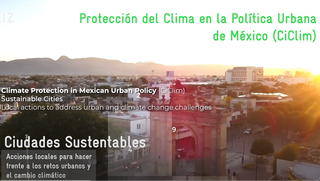
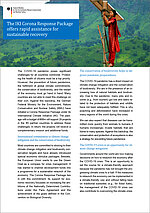
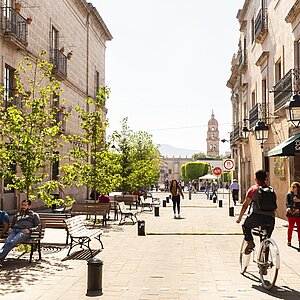
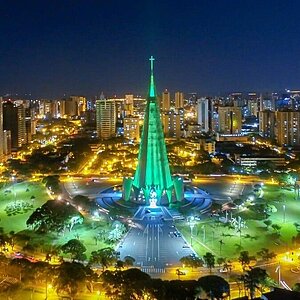


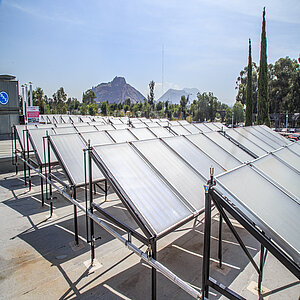
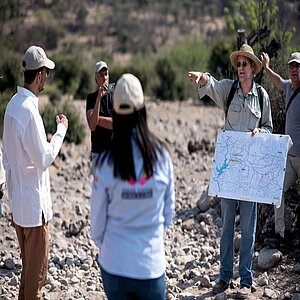
![[Translate to English:]](/legacy/_processed_/5/5/csm_Indien_EE_Solar_Frau_bfcf99c425.jpg)
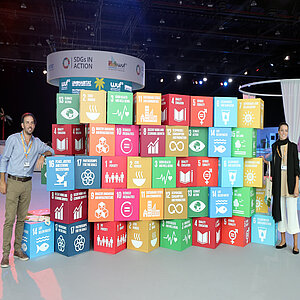
![[Translate to English:] Die Petronas-Türme im Stadtbild Kuala Lumpurs; Foto: Unsplash/Ishan](/legacy/_processed_/f/8/csm_180215_ishan-seefromthesky_Header310_661e6fc5b9.jpg)